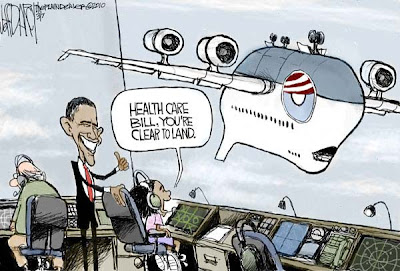USA Health Care Reform (3)

1.º - Democrats Planning for Health Bill Vote Next Week link
2.º - Health Reform Myths link
3.º - Health Care’s Obstacle: No Will to Cut link
4.º - How to Think about Future Health Care Spending link
5.º - Can the States Nullify Health Care Reform? link
6.º - Getting Obama Right link
7.º - Estimate of the Budgetary Effects of the Senate-Passed Health Bill link
8.º - Getting Health Reform Over the Finish Line link
9.º - 625 – That’s the number of people who lost their health insurance EVERY HOUR in 2009 link
2.º - Health Reform Myths link
3.º - Health Care’s Obstacle: No Will to Cut link
4.º - How to Think about Future Health Care Spending link
5.º - Can the States Nullify Health Care Reform? link
6.º - Getting Obama Right link
7.º - Estimate of the Budgetary Effects of the Senate-Passed Health Bill link
8.º - Getting Health Reform Over the Finish Line link
9.º - 625 – That’s the number of people who lost their health insurance EVERY HOUR in 2009 link
Etiquetas: USA health 3

























2 Comments:
...
With the size and scope of the bill, which as Republicans are quick to note affects as much as a seventh of the US economy, stakes are high as are passions on all sides. Final adoption is still expected to be a challenge. “I give it a 50/50 chance”, said Paul Ginsburg, president of the non-partisan Center for Studying Health System Change in Washington, DC. Although those are not great odds, he noted they are better than he would have given earlier this year when the reform was floundering in the middle of a messy political situation, and many predicted its imminent death.
Observers said that turning the situation around showed much needed and long delayed leadership from President Obama. The White House organised a televised summit about health care with key congressional Democrats and Republicans on Feb 25. The White House included some Republican provisions in its final version of the bill, but it did not gain any votes. “It was like putting a nice paint job on a house [Republicans] didn't want to build in the first place”, said Richard Hamburg, deputy director of Trust for America's Health, a non-profit public health advocacy group.
Republicans avidly protest the Democrat's planned legislative scheme, saying it is a bald circumvention of intended Senate protocol. They continue to urge scrapping the current proposal and working toward a less expensive, incremental, free market approach. But Obama and other Democrats argue covering the uninsured and stabilising and expanding the insurance market requires bold, comprehensive action. “Unless everyone has access to affordable coverage, you can't prevent insurance companies from denying coverage based on pre-existing conditions; you can't limit the amount families are forced to pay out of their own pockets; and you don't do anything about the fact that taxpayers end up subsidising the uninsured when they're forced to go to the [hospital] emergency room for their care. The fact is, health reform only works if you take care of all these problems at once”, Obama said.
lancet 13.03.10
Barack Obama is seeking final approval of his health-care reform bill in the coming weeks. But some observers are sceptical about his chances. Nellie Bristol reports from Washington, DC.
President Barack Obama is championing what has been termed his last best chance for comprehensive US health reform, urging Congressional Democrats to adopt the measure in the next few weeks. “Every argument has been made. Everything there is to say about health care has been said and just about everyone has said it”, he told a group of health-care providers at the White House on March 3. In developing his end game for the reform debate, Obama seemed to jettison any hopes of bipartisan approval for the bill, acknowledging that the philosophical differences between the two parties were too large to overcome.
If finally passed, the measure would alter insurance practices that penalise patients and moderate premium increases. It would create new insurance purchasing mechanisms that would make it easier for individuals and small businesses to find and afford coverage. It would require most Americans to have insurance and provide subsidies to help those in need to afford it. Obama and the Democrats hope the measure will provide coverage for 31 million people who are uninsured in the USA. The cost of the effort is expected to be about US$100 billion a year, the bulk of which would be paid for with federal spending reductions and tax increases.
Final adoption requires some delicate legislative manoeuvring and some fast talking by Congressional leadership. Although both the Senate and House have approved reform bills almost solely on Democratic votes (one Republican voted for the measure in the House), there are substantive differences between the measures that normally would be resolved by a conference between the two chambers. But the switch from Democratic to Republican of one seat in the Senate after the bill was originally passed on Dec 24, left Democrats a vote short for approval of the negotiated version. The chambers plan to reconcile their differences through an unusual and complicated process that requires the House to accept the Senate bill, and then ask the notoriously unpredictable Senate to approve its modifications in separate legislation. The changes would be included in a measure that requires only a majority vote rather than the 60 vote super majority needed to ensure passage of most contentious bills. Republicans have 41 of the Senate's 100 seats.
lancet 13.03.10
Enviar um comentário
<< Home